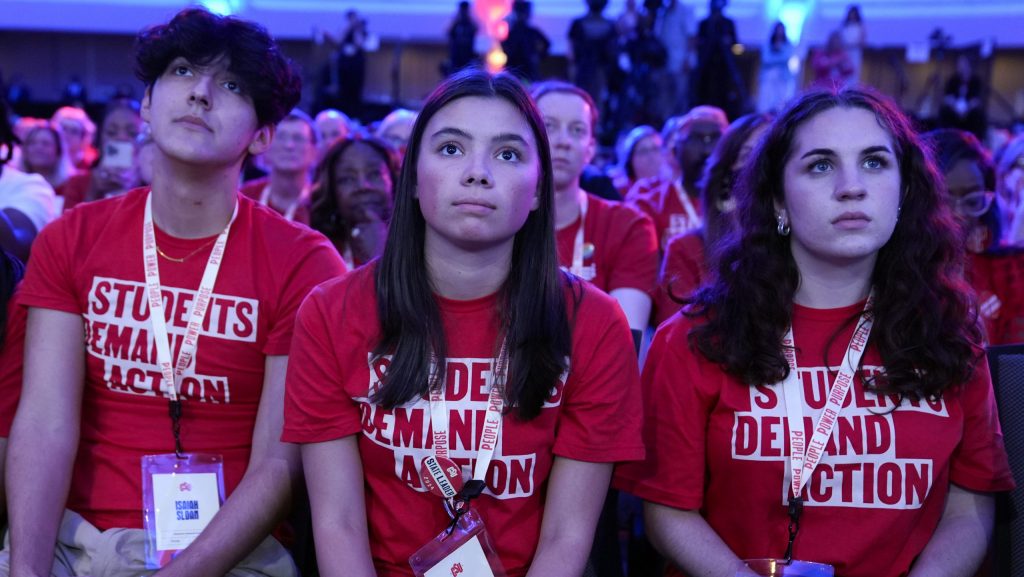Created Equal: How Gen Z became the ‘lockdown generation’
Justina Giglio June 18, 2024Stephen Henderson was joined by a student, a former educator and a gun-violence expert on Tuesday to discuss how gun-violence in schools has affected Generation Z.

People listen as President Joe Biden speaks to Everytown for Gun Safety Action Fund's "Gun Sense University," at the Washington Hilton, Tuesday, June 11, 2024, in Washington.
In light of the shooting at a Rochester Hills splash pad on Saturday, there is no better time to talk about how gun violence unequally, and uniquely, impacts the childhoods of America’s youth.
The increasing prevalence of mass shootings in schools and public places has forged an alternate name for Generation Z. Growing up in the midst of America’s gun violence crisis, some are calling them the “lockdown generation.” Their lives have been defined by preparation for random mass violence — something that previous generations didn’t experience.
Because America’s gun violence crisis is a very modern issue, best practices for active shooter training and drills are still being pioneered. Research has shown that the lack of standardized preparedness efforts across the country can have negative emotional and academic consequences for American children.
On Tuesday’s episode of Created Equal, host Stephen Henderson spoke with a student, a former educator, and a gun-violence expert to discuss the experiences of the “lockdown generation.”
Subscribe to Created Equal on Apple Podcasts, Spotify, Google Podcasts, NPR.org or wherever you get your podcasts.
Guests:
Marissa Ford is a student at Grosse Pointe North High School and is a group leader for her school’s chapter of Student’s Demand Action. She says that the proximity of gun violence to her and her peer’s lives compelled them to join a gun-violence prevention advocacy group.
“We work to advocate for common sense gun laws and gun-sense legislation to work to end the epidemic of gun violence,” she said. “Seeing all of the multiple instances of gun violence, just in schools and stuff close and near to us just made me and a few other students want to take action.”
Ed Hubert is a former high school teacher who wrote an activity book called “Hidin’ Zeke” to help elementary-aged students with lockdown anxiety. He says the more serious-nature of lockdown drills can be harder for young children to deal with.
“What happens in a, let’s say, a fire drill, [is] the kids exit [the] school and they get to talk with their friends, and you know, they can visit. The same thing with the tornado drill. They stay in place, but they can still talk with one another, and that type of thing,” he said. “When you go into a lockdown, you’re asking a child to step down into a corner someplace, with the lights out, curtains pulled with no noise. And, that is a pretty scary situation for young kids.”
Dr. Jaclyn Schildkraut is the executive director of the Regional Gun Violence Consortium at the Rockefeller Institute of Government. She details how the generational differences in gun-violence experience can breed tension and anxiety between kids and adults.
“A lot of adults tend to have that sort of pre ‘99 mentality, where this wasn’t normal, trying to coexist at a time for the 2024 mentality, where it unfortunately is. That ends up breeding a lot of tension in the sense that a lot of the anxiety that I’ve observed in the projects that we’ve done have not been the students directly,” she said. “It’s the adults who are, you know, manifesting this anxiety, and that’s what they’re modeling to students who then intercept that anxiety because they’re looking at the adults as their protectors.”
Listen to Created Equal with host Stephen Henderson weekdays from 9-10 a.m. ET on 101.9 WDET and streaming on-demand.
